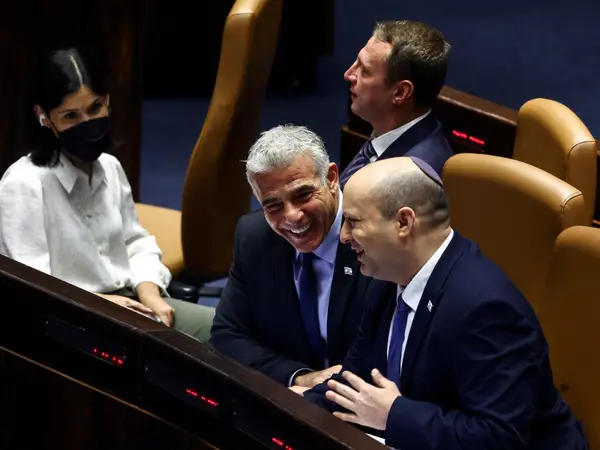Israel’s Channel 12 television has reported that in an air attack on targets in western Syria Saturday an important shipment of Iranian weapons was destroyed.
Meanwhile, the new Israeli prime minister Yair Lapid in his first televised speech said, “the Iranian threat is the greatest threat facing Israel.”
The Syrian military said on Saturday that several missiles hit positions in the west of the country south of Tartus near the border with Lebanon, but claimed the targets were poultry farms. The UK-based Syrian Observatory for Human Rights said the animal husbandries are believed to be used by Iran-backed Lebanese group Hezbollah for military purposes.
Channel 12 in its report Saturday evening said that a shipment of weapons from Iran, possibly air defense systems that were unloaded a week earlier were the target of the Israeli attack. Earlier Israeli officials had said that Iran was working to beef-up Syria’s air defenses, obviously to protect its forces and Hezbollah, since Israel is not interested in attacking the Syrian military per se.
Israel has conducted hundreds of attacks against Iranian and Lebanese Hezbollah targets in Syria since early 2017, but it routinely remains silent about acknowledging any specific operation.
Last December, Israel twice attacked Syria’s Mediterranean port of Latakia destroying large amounts of material Syria said at the time. Photos published showed massive fires and damage in the port area.
Russia, which had undisputed military sway in Syria, apparently had secret understandings with Israel not to interfere against Israel’s strikes against Iranian targets, usually weapons shipments and depots intended for Hezbollah and for building up a presence on the Syrian side of the Israel’s norther border.
The picture of the Russia-Israel-Iran triangle is less clear since the invasion of Ukraine and reports that Moscow has been reducing its military presence in Syria. However, Israeli attacks have continued.
Lapid in his Saturday address made it clear that Israel’s assessment of the Iranian threat will remain the same in the new government. “We believe that the Iranian threat is the gravest threat facing Israel. We’ll do whatever we must to prevent Iran from acquiring a nuclear capability, or entrenching itself on our borders,” he said.
He went on to renew Israel’s customary warning to enemies: “I stand before you at this moment and say to everyone seeking our demise, from Gaza to Tehran, from the shores of Lebanon to Syria: don’t test us. Israel knows how to use its strength against every threat, against every enemy.”
The previous government headed by Naftali Bennet, in which Lapid occupied the key post of foreign minister, advanced a new policy dubbed the “Octopus Doctrine’, stipulating that it will not just be content with hitting Iran’s “tentacles”, meaning proxies, and will aim at the head of the octopus.
This policy perhaps manifested itself in repeated attacks against sensitive targets and key military and intelligence officials inside Iran. The offensive has rattled Islamic Republic’s establishment, which began purging intelligence and counter-intelligence officials in June.
